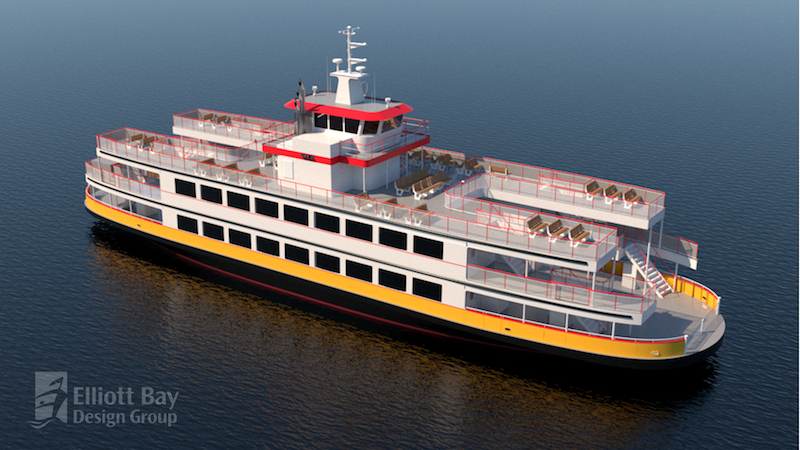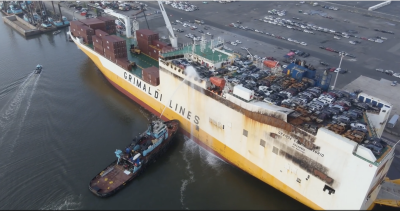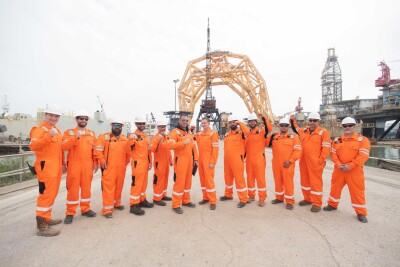Portland, Maine-based Casco Bay Lines will soon begin construction on a new ferry that will use innovative battery technology.
The ferry will be powered by a diesel-electric hybrid propulsion system that will make Casco Bay Lines one of the first U.S. public passenger ferry systems to fully utilize such technology that will eliminate up to 800 metric tons of CO2 emissions annually, the ferry operator said.
Since identifying the need to replace the Machigonne II, the passenger and vehicle ferry that currently services Peaks Island in Casco Bay, Casco Bay Lines has secured $16.3 million in funding, conducted a three-year design process, and held more than 14 public meetings to construct a new vessel.
During their Feb. 25, 2021, meeting, the Casco Bay Island Transit District board of directors reviewed the proposed final vessel design and voted to authorize the execution of a contract with a qualified shipyard to build the new ferry. Casco Bay Lines hopes to put the new vessel into operation by the end of 2022
The vessel was designed by Elliott Bay Design Group (EBDG), which said the estimated cost of the diesel-electric hybrid ferry will be $14.2 million.
EBDG's recommended design is a 164'x40'x12', double-ended ferry capable of carrying up to 599 passengers and 15 cars. EBDG, in its January 2020 preliminary design report, said that a double-ended ferry would offer advantages over Casco Bay Lines' existing single-ended ferry operation. A single-ended ferry requires a higher transit speed to maintain schedule because of increased maneuvering time in and out of the terminals, EBDG said. As a result, a notional double-ended ferry offers significant energy savings.
The 122'x37' Machigonne II can carry 399 passengers and 12 vehicles. The ferry, built by Blount Boats in 1987, has a top speed of 10.5 knots.
The new ferry will increase the number of vehicles that can be carried to and from Peaks Island from an average of 10 per trip to 16, enhance passenger safety through an improved vessel layout, allow for side loading at the Portland terminal, and feature modern fixtures and finishes.
Charging while docked in Portland, and operating in battery-powered mode whenever possible, the new propulsion system will eliminate up to 800 metric tons of CO2 emissions annually. It will also significantly reducing exhaust fumes, excessive engine noise and vibrations found on other vessels, the transit district said. The propulsion system will be provided by ABB.
“Momentum for lower carbon footprint ferry operations continues to grow worldwide,” said Bruce Strupp, senior account manager, new build, ABB Marine & Ports. “ABB is honored that its integrated electric, digital and connected solutions are being considered integral as more and more U.S. operators replace obsolete vessels to match regulatory and societal demands.”
“This new vessel will transport vehicles, freight and hundreds of thousands of passengers between the mainland and Peaks Island every year for the next 30 years,” said Hank Berg, general manager of Casco Bay Lines. “We are incredibly excited to be updating our aging fleet with something designed and equipped to meet current and future needs of the District. Our customers increasingly view the sustainability of our operations and the stewardship of Casco Bay as important components of our service, in addition to reliability, safety and comfort. The hybrid-electric propulsion system will significantly reduce carbon emissions over the life of the vessel and provide a clear environmental benefit for our region.”
Casco Bay Lines was awarded nearly $4 million in 2020 for the propulsion system, including $3.2 million in competitive grant funding to procure the technology through the FTA’s Passenger Ferry Grant program, and $750,000 through the Maritime Administration (Marad) Maritime Environmental and Technical Assistance (META) Program to go towards various components of the project. Casco Bay Lines will work with Marad to assess efficiency data and do additional testing and reporting on the hybrid engine and battery charging systems for use by others in the maritime industry.
More information on the ferry project is available at www.cascobaylines.com/about-us/project-information/fleet-evaluation-project/.




.png.small.400x400.png)
